Key Points:
- Your 401(k)’s life span will depend on what other investment assets you have.
- Your 401(k) administrative and fund fees can make a huge difference to your portfolio.
- It will also depend on how much you will likely spend in retirement.
- It’s best to think about a 401(k) balance in the context of other investments you have, rather than on its own.
The answer to how long your 401(k) will last is the same answer that pops up with a lot of personal finance questions.
But “It depends” isn’t a very satisfying answer, is it?
So let’s run through a few specifics that will allow you to answer the question a little more satisfactorily.
Are you maximizing your 401(k) contributions?
Be sure to get the free money at least--which is to say, what your employer matches. It might be a dollar-for-dollar match up to a certain amount, or something that vests over time. Regardless, you’re leaving money on the table if you don’t contribute at least this amount.
But that free money should just be the start--really the absolute minimum you should do. Fidelity will tell you to save 15% of pretax income per year. That’s solid advice. You may need to step that up a bit if you’re into your 30s or even 40s and are behind on your contributions.
If you can go a little further, even better. Make it a habit to increase the percentage each year. Even by a half a percent. Between that and your raises, you’ll give your plan a bit of a turbo boost.
(Once you’ve got your 401(k) contributions maxed out, you can read about other tax-advantaged accounts you can max out here.)
What else have you got?
After getting your 401(k) saving regimen squared away, take inventory of what other sources of income you might have when retirement time comes. Social Security, of course. Pensions, perhaps. Do you have taxable brokerage accounts, or do you plan to sell some assets like a home, business, or rental property? All of these things will factor into the question of how long your 401(k) will last.
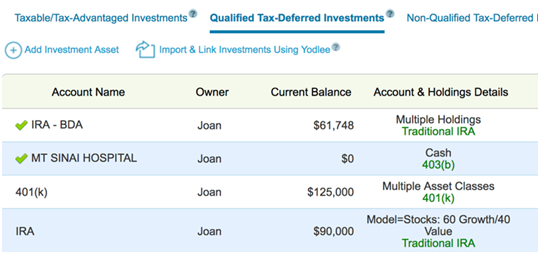
What will your spending look like?
How quickly a full tank of gas will disappear depends largely on the size of the car and how its driven.
Like that tank of gas, your 401(k) and other investment assets will be depleted faster if your retirement plan is the equivalent of a Lincoln Navigator, and will last longer if it’s more like a Corolla. Either one could work, but you’ll want to have a very solid grip on your plan’s MPG--that is, your projected spending in retirement--to get an accurate reading.
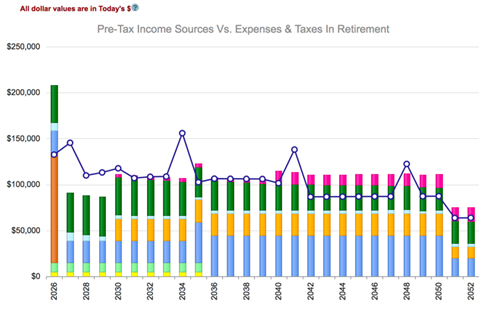
Our Contestants
Joan and Marty are in their early 50s and hoping to retire in about 10 years. They have about $950,000 in investments in total, and hope to spend about $100,000 in the early years of their retirement, tapering off to $85,000 after they have traveled for a few years.
Joan has a 401(k) and is currently contributing $8,000 to it annually. That’s almost 14% of her gross pay--a commendable achievement. The couple is also putting a little bit into a taxable account and a Roth IRA each year.
As it stands now, based on a Monte Carlo simulation, the couple has about a 68% chance of meeting all of their retirement goals:
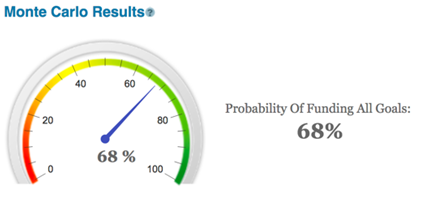
But what happens if Joan follows some of our advice above, and makes it a habit to bump up her contributions 5% each year?
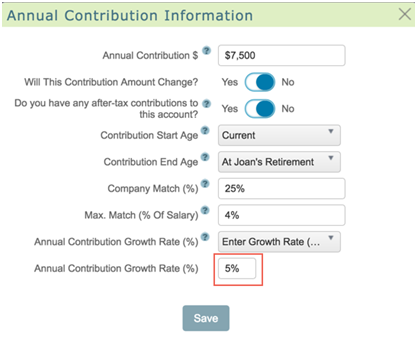
It can make a bigger difference than you might think. In this case, their plan’s probability of success jumps to 75%.
Watch out for those fees
It is a dirty little secret in the finance industry that many 401(k) plans charge large fees to their customers in the form of administrative fees. This is on top of any fees you pay for the funds you invest in. Fees can be a killer for retirement portfolios over time. The chart below shows you what happens to a 401(k) portfolio that returns 7% per year with varying fees. The dollar values are the ending portfolio balance after 20 years with contributions of $18,000 per year.
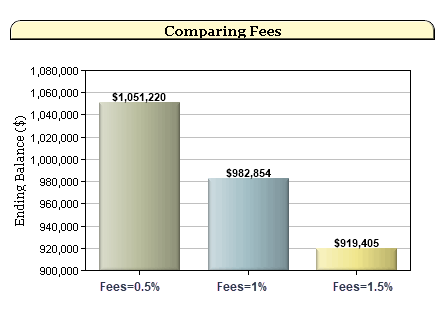
Fees can clearly take a large bite out of your retirement funds. So what can you do about it? The first thing is to ask your Human Resources department if the 401(k) plans charges an administrative fee, and what that fee is. If it seems excessive (more than 0.10%), plead with HR to simply go with Vanguard for your company’s 401(k) plan. Vanguard is the leader in low cost funds and is now becoming a leader in low cost 401(k) plans.
You can also view the fees on the funds you have available to you in the plan. If you cannot find any funds that have an expense ratio below 0.5% then something is very wrong. You should also have the option of a target date retirement fund, which rebalances towards less risk automatically as you get older. Once again, plead with HR to switch 401(k) providers so fees won’t eat up your retirement savings.
A large 401(k) balance can be an important piece of a successful retirement plan. But it’s more important to take a holistic approach. Overall savings (including that 401(k) but all other accounts as well), where you plan to invest your assets, and what you plan to spend in retirement will all factor into whether a plan is going to work or not.